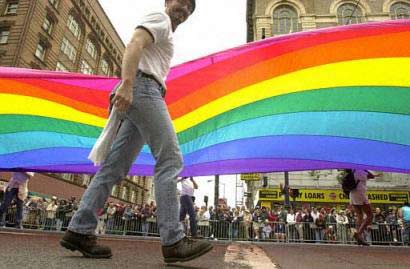New statistics suggest San Francisco has the highest percentage of gay men
among major cities in the world, with a quarter of them HIV-positive, a top city
health official said on Friday.

A participant in San Francisco's 33rd annual
Gay Pride Parade helps carry a rainbow flag, June 29, 2003. [AP
Photo] |
"Despite an overall loss in the population in San Francisco in the last five
years, we think there has been an absolute gain in gay men," William McFarland,
head of HIV/ AIDS statistics at San Francisco's Department of Public Health,
said in an interview. "From all the data I have seen ... it's the gayest city in
the world."
McFarland has compiled the city's first survey in five years on gay men and
HIV to be presented at a meeting next week to discuss HIV/AIDS prevention.
He said it found an estimated 63,577 gay males aged 15 and above in San
Francisco, a city with a total population of 764,000. That figure represents
nearly one in five of the city's males above the age of 15.
0ne out of every four gay males -- 25.8 percent -- is infected with the HIV
virus, giving San Francisco an estimated total of 16,401 HIV-positive men, said
McFarland, an epidemiologist who has also worked on studies in Uganda, Zimbabwe
and Egypt.
The survey indicates that the overall percentage of those living with HIV has
dropped since the last study five years ago.
"The major changes since 2001 are that, first of all, the gay community has
grown. It's largely been an influx of more HIV-negative gay men that are here,"
he said. "It used to be near 30 percent.
"The absolute number of gay men living with HIV has crept up partly because
of ongoing transmission and partly because of improved survival with treatment,"
he added.
At 40 percent, Baltimore has the highest percentage of HIV-positive men among
its population in a study of five cities, with San Francisco second, according
to a 2005 Centers for Disease Control and Prevention study.
In coming up with his estimate of the number of gay men, McFarland said he
took the middle point of nine previous studies.
McFarland acknowledged that it was difficult to get a precise number because
of sensitivities over the issue. But he said San Francisco residents were likely
to be more open about their sexuality than people in many other
areas.